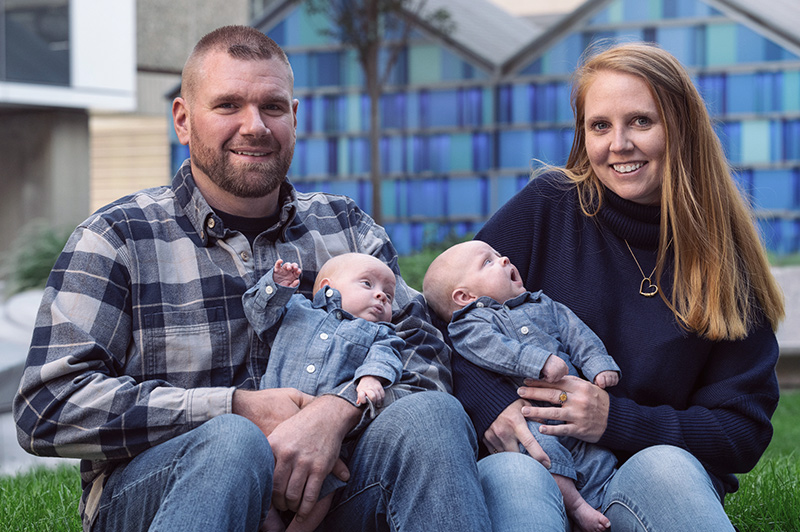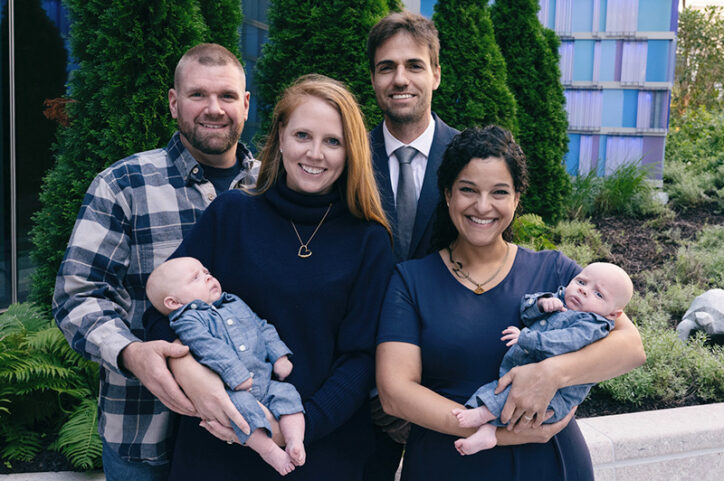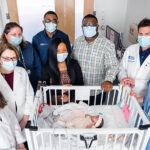Finding comfort and answers for twin-twin transfusion syndrome: Shannon’s story

Shannon’s journey through a challenging pregnancy with TTTS (twin-twin transfusion syndrome) was, as she puts it, an emotional rollercoaster. In addition to the usual first-time parent jitters and the unexpected news of twins, Shannon and Mike navigated the emotional ups and downs of the rare pregnancy complication. TTTS put their twins at severe risk of health complications, but Shannon credits Boston Children’s Maternal Fetal Care Center (MFCC), in affiliation with Brigham and Women’s Hospital, for helping them through it.
“They gave me hope when I had none,” she says.
A complex Mo-Di twin pregnancy
When Shannon learned she was pregnant with her sons, she sought care from a maternal-fetal medicine specialist (MFM) just south of Boston, as pregnancies with multiples can be higher risk and require specialized care and monitoring. She credits her MFM at South Shore Hospital for providing outstanding care and guidance, especially once her pregnancy was classified as monochorionic-diamniotic (Mo-Di) — when twins share a single placenta (monochorionic) but have two separate amniotic sacs.
Mo-Di pregnancies present an increased risk of complications such as TTTS, a condition where one twin receives too much blood flow and the other too little due to an imbalance in the placenta’s blood vessels. TTTS can lead to significant preterm birth, neurological issues, and more. Shannon’s MFM recommended she visit a maternal-fetal care center that specializes in surgically treating conditions such as TTTS and suggested the MFCC. Shannon and Mike wasted no time connecting with the center. She was 19 weeks along when they first met with the team.
“Right from the first call with Nicole Peace, the MFCC’s nurse practitioner, it was just amazing,” says Shannon. “You’re going through so much physically and mentally, and she just puts you at ease. It’s as if you’ve known her forever, and that just made me feel so comfortable.”
Shannon and Mike had several consultations with the MFCC team and numerous ultrasounds to assess how the TTTS was progressing and to determine the timing of surgery to disconnect the interconnected blood vessels and fix the imbalance of blood between the twins. Shannon says fetal surgeons Dr. Eyal Krispin and Dr. Alireza Shamshirsaz (Shami) helped her and Mike feel informed and empowered as they navigated each step. “Dr. Krispin is a miracle man,” Shannon says. “He drew pictures on a whiteboard about TTTS, including all the different stages, and let me ask my millions of questions. He explained everything in depth.”
Navigating the decision for TTTS surgery
TTTS is usually categorized into five stages based on the severity of the condition.
Shannon was at early stage I TTTS, so at first the specialists recommended expectant management and provided close monitoring.
Surgery to address the blood flow imbalance between twins with TTTS carries certain risks, including the potential loss of one of the twins. Shannon says Dr. Krispin, Dr. Shami, and the entire team provided guidance and assurance as she and Mike weighed the decision on when to proceed with surgery.
“It was a mind game,” Shannon says. “You don’t know what to choose. I owe everything to my team for their compassion, attention to detail, and for just being so down to earth when I was dealing with so many emotions.”

The twins were monitored closely through routine ultrasounds. Findings demonstrated progression of the disease, so Shannon and Mike decided to move ahead with surgery.
Shannon was awake but under slight sedation when Dr. Krispin performed fetoscopic laser surgery at 23 weeks and six days to disconnect the blood vessel connection between the twins. Peace stayed by her side through the procedure and let her know when the team captured two strong heartbeats at the end.
Even though the surgery was successful, the journey was far from over. Following a short recovery at Brigham and Women’s Hospital, the MFCC team guided Shannon throughout the remainder of the pregnancy working closely with her referring MFM.
A joyful arrival and hope for other TTTS families
This past June, at 32 weeks and six days, Shannon and Mike welcomed Luke and Liam into the world. After extended stays in their local NICU, today the boys are home and thriving, and Shannon and Mike are navigating the new world of parenthood — times two.
Despite the physical and emotional struggles during her pregnancy, Shannon is immensely grateful for the care she received at Boston Children’s.
“If it weren’t for Dr. Krispin and the team, the boys and I would’ve had a completely different outcome,” she says.
Shannon hopes her story reaches other families facing the unique challenges of TTTS and looking for answers.
“Every patient deserves the care I received from the Maternal Fetal Care Center,” she says. “If they’re going through what I went through, they deserve to go through it with them.”
Learn more about the Maternal Fetal Care Center at Boston Children’s Hospital or request a second opinion.
Related Posts :
-

Rowan the Remarkable: Defying the odds with CPAM
This is the story of a baby named Rowan and his remarkable journey of beating the odds after doctors discovered ...
-

Changing the world: Baby Denver leads the way after first-of-its-kind procedure for VOGM
Denver Coleman is less than 2 months old, but she’s already helped blaze a trail for other children and families, ...
-

The sooner the better: An argument for fetal MRI before 16 weeks
To date, fetal magnetic resonance imaging (MRI) has been limited to the mid-second or the third trimester of pregnancy. This ...
-

Years in the making: Team performs successful fetal intervention for VOGM
On an ordinary Wednesday in March, a team of specialists from two institutions made the extraordinary happen: a first-of-its-kind intervention ...





